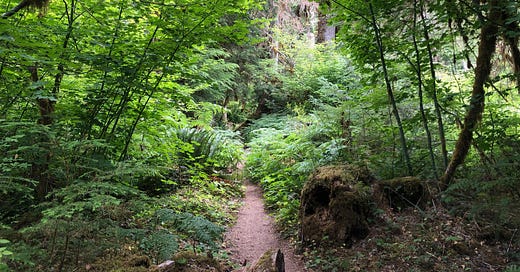A highlight of our last trip to the northwest was discovering the wonder that is Sol Duc campground in Olympic National Park. Situated along the Sol Duc River near old growth forest, between hiking trails and a mineral hot springs resort, it offers a near ideal car camping experience (close to glamping, really). With a little advance planning, we were able to reserve two nights at the campground this year.
The hot springs resort was first developed in 1912, but for thousands of years prior, the local Native Americans knew Sol Duc —the name is from Quileute1, meaning “sparkling waters” — for its therepeutic value. Today, thousands of visitors — mostly of European descent if our visit was any indication — come to the springs for the same reason. Being no different, we spent as much time as we could soaking over the few days of our visit.
I’d been anticipating the return as much for the dawn chorus I recalled from 2022, when it felt like our tent was surrounded by a chorus of birdsong each morning. But this visit felt relatively quieter. A single Pacific Wren calling, a distant Pacific-slope Flycatcher. Perhaps it was the cloud cover? Or maybe my unrealistic expectations? Or climate change? A light rain misted our tent each morning, and our our site was a little closer to the road than last time. And admittedly, climate dread has been a constant overlay for me these days.
Still, the mineral springs and forest worked its magic. We hiked from camp through the forest to the main falls trail one day, and every tree and stump seemed to evoke some mystical being. A banana slug inched across the trail and Red Crossbill called from the tree. We kept an eye out for Black Bear 2 — another camper reported a close encounter with one near the river — but the only four-legged creatures we saw were chipmunk and a rabbit who lived in a hollow stump near our site.
Later, a family of inquisitive Canada Jay came down from the treetops to visit, investigating our picnic table (and anything on it!) after we ate, an expected behavior for the bird. Common names for the bird including ‘camp robber' and ‘whisky jack,’ another name that came by way of an indiginous name, ‘Wisakedjak,' which was “used in the Algonquian family of aboriginal languages of eastern Canada to designate a mischievous, transforming spirit who liked to play tricks on people.”3
“[Quileute] is a complex tongue typified by clicked sounds, epiglottal stops and tongue twisting strings of consonants with words that would run off the page, for example: “kitlayakwokwilkwolasstaxasalas” which means “those are the people who think that I am the one who is going to Forks”. …It has the distinction of being one of only five languages in the world that have no nasal sounds (no m or n). Quileute is also one of the few languages not known to be related to any other tongue.” — Quileute Nation
Shortly after our visit, I enjoyed reading “The Bear in Our Backyard:Throughout North America, they’re showing up in unexpected places. Can we coexist?” by Jill Lepore in the most recent The New Yorker.
“Wisakejak” Native Languages



